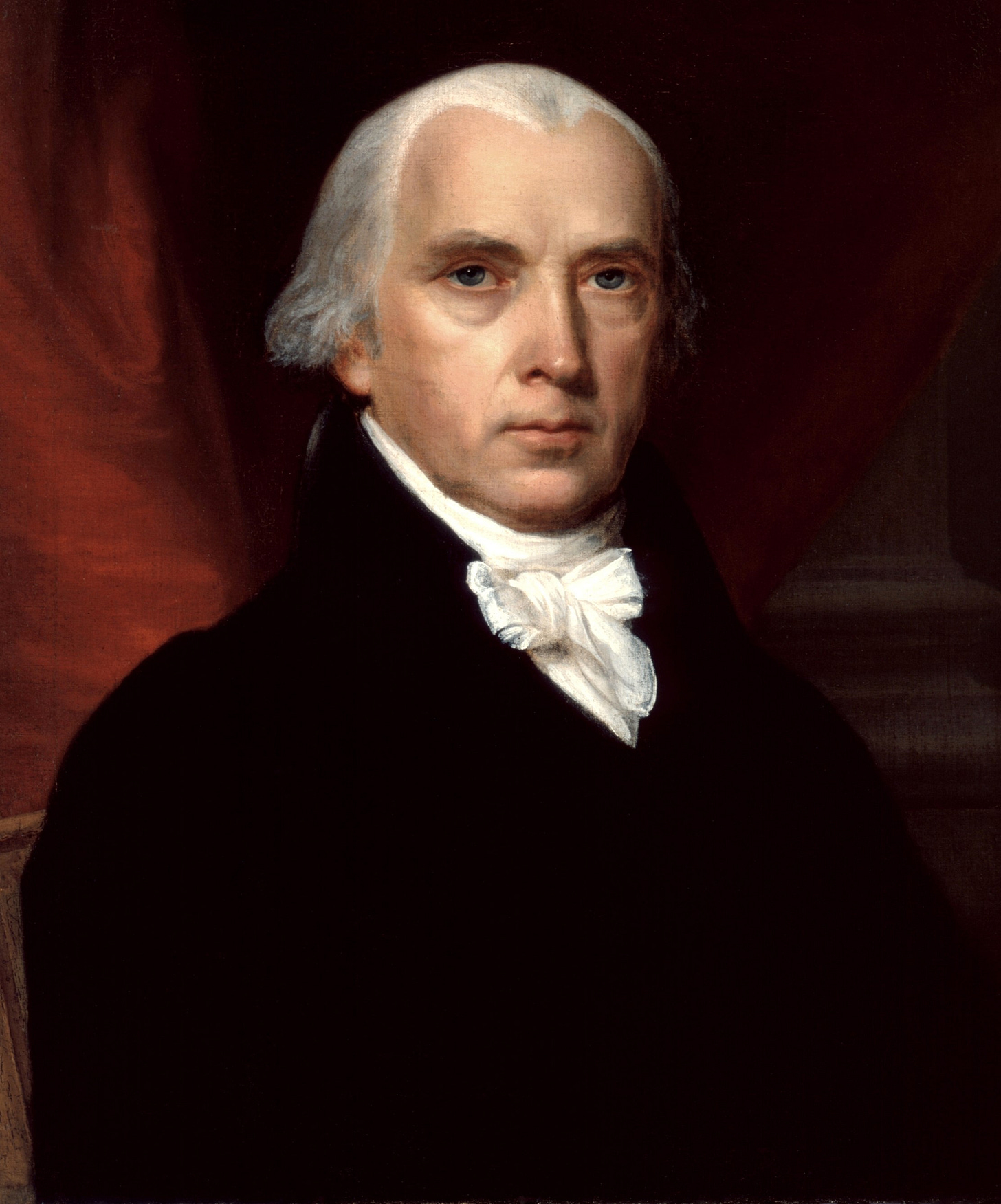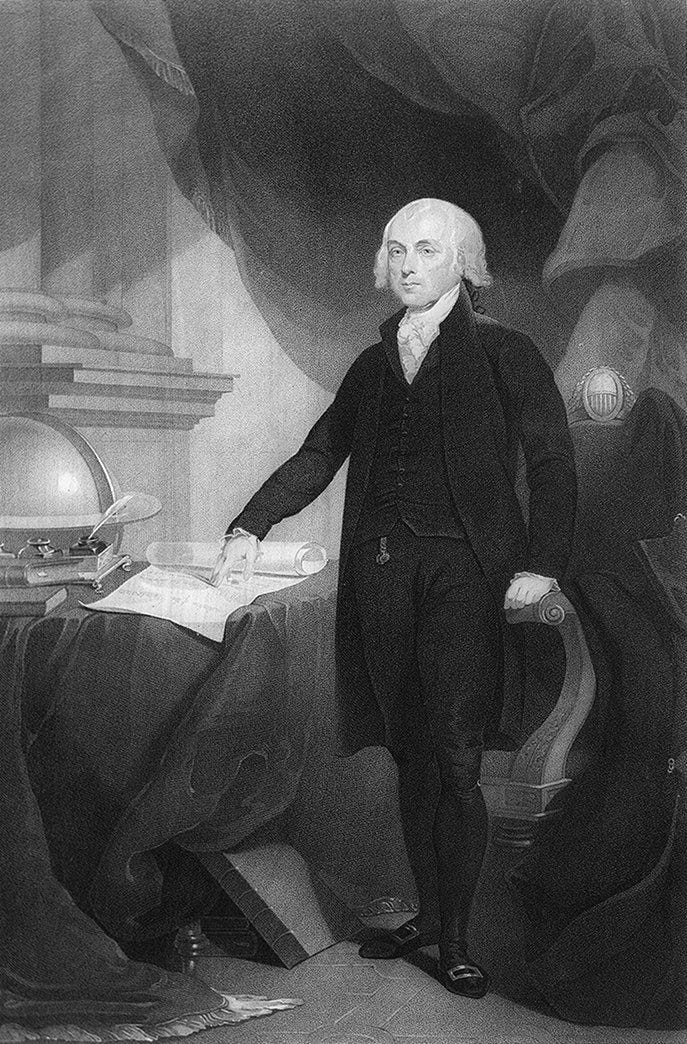I read three books about the fourth president of the United States, James Madison. The first was a biography, James Madison, by Richard Brookhiser. Compared to the biographies I read about Washington, Adams, and Jefferson, this one was shorter and more to the point. In one sense I appreciated it due to time management, but in another, I felt that some of the background of events of his life was lost.
Another book that I read about him was also short, but it managed to do a better job of giving more in depth explanations of events in his life. The book is titled A Slave in the White House by Elizabeth Dowling Taylor. It wasn’t only about Madison, it was about Paul Jennings, the man who wrote the first American presidential memoir and who was enslaved by Madison. So far in my presidential picks, this book has tied in the number one spot with the biography I read on Thomas Jefferson in terms of readability.
The third book that I read was a great wrap up on all of the first four presidents, The First Principles: What America’s Founders Learned from the Greek and Romans and How That Shaped Our Country by Thomas E. Ricks. The book discussed how each of the first four presidents were exposed to Greek and Roman culture and literature, which as a former Latin student I found very interesting. (I have to admit, I was not the best Latin scholar, although ironically, I won the award for best Latin student at my high school. If memorizing my sister’s translation of the Virgil’s Aeneid from her high school Latin binder that I salvaged out of our shared bedroom closet constitutes being the “best,” I guess that is what I was.) In all seriousness, I would highly suggest his book to anyone with an interest in American history to learn about how the knowledge of the Roman and Greek cultures impacted the founding of our country. This book gave me a sense of hope for the future.
Here are some of my takeaways from these presidential picks about Madison:
Small stature, big impact
When I saw the half portrait of James Madison, I envisioned a tall, strong man. However, when I read the biography I was stunned to learn that he stood at a mere 5’4 and was very thin, considered even frail. He was in fact the shortest president on record. I don’t know that this would have crossed my mind had I not been reading about him during the dramatic 2024 election, but learning about his height made me wonder how tall the candidates in the election were. I learned that Kamala Harris, oddly enough, is the same height as Madison, 5’4, and Donald Trump is 6’3.
The words “unprecedented” or “anomaly” have come up in our past few elections, for different reasons. One anomaly that is overlooked is what would have been if Kamala Harris or Hillary Clinton had won. The past seven presidents have all been above six feet except George W. Bush who just a half inch short of it at 5 ft 11 1⁄2 in. Hillary Clinton stands at 5’7.
I remember reading at some point during my studies in college that a woman who is taller is typically found to be offered a higher salary. It is interesting to think how our perception of competence or strength may be affected by a person's height, something that is not necessarily in the forefront of our awareness.
Madison was short even for his time, but despite this and his tendency toward introversion, pointed out by the author Thomas E. Ricks, and even chronic illness that he experienced, he was able to overcome societal perception and play an important and strong role of leadership in the founding of America.
One hilarious story relating to his small stature described in the book about Paul Jennings is that Madison’s wife Dolly Madison would at times give Madison piggyback rides around their house.
He knew things
Have you ever seen the meme that says something to the effect of, “that’s what I do, I drink coffee and I know things.” This saying came to mind when I was reading about Madison. He was very knowledgeable and kept himself updated on the happenings around him in the political world. We tend to think more of George Washington and Thomas Jefferson as the leaders of the Revolutionary Era, but I do not think they would have been able to maneuver their roles had it not been for the behind the scenes feedback they received from Madison. Washington more than once had counted himself out during important steps in his ascendancy to power. Madison recognized the necessity of Washington’s actions and advised him against withdrawing himself. Washington would comply with his advice. After the loss of his wife, Jefferson was in a stage of grief that left him dormant. It was Madison who coaxed him into eventually taking the important role that he would play in Paris, France, to help him get out of this state of grief and onto a forward trajectory that led to his presidency.
What inspired him in the first place?
Something I found interesting about Madison is what drove him into politics in the first place. Madison, who himself had been baptized into the Anglican church, learned of Baptists in the state of Virginia being persecuted by the Anglican church and was passionate in their defense and his belief in the separation of church and state. There is a quote by Madison that speaks to his beliefs:
“the purpose of separation of church and state is to keep forever from these shores the ceaseless strife that has soaked the soil of Europe with blood for centuries.”
I think it would do good for Americans to read up on Madison and his belief in the separation of church and state when it seems that many have forgotten this fundamental principle that built our country.
Madison is evacuated in the War of 1812
There have been two times in my life when it was shocking to witness institutions in America being attacked or invaded. One event was when the Pentagon was attacked on 9/11, and the other was when the US Capitol Building was invaded on January 6th. It was interesting to read about Madison being evacuated from the White House during the War of 1812, as we don’t often think about or hear of times when our institutions have been under attack. One story I read about that, which was given some clarification from Paul Jennings, was the rescue of a portrait of George Washington from the White House during the evacuation. In my next post, Presidential Picks 4.5, I will discuss this story.








He was an interesting man for sure. I think he honestly did more than the presidents we tend to idolize more, but he didn't seem to care too much about getting credit or celebrity. He just got things done!
Can't wait to learn more about the rescue of the portrait of George Washington.